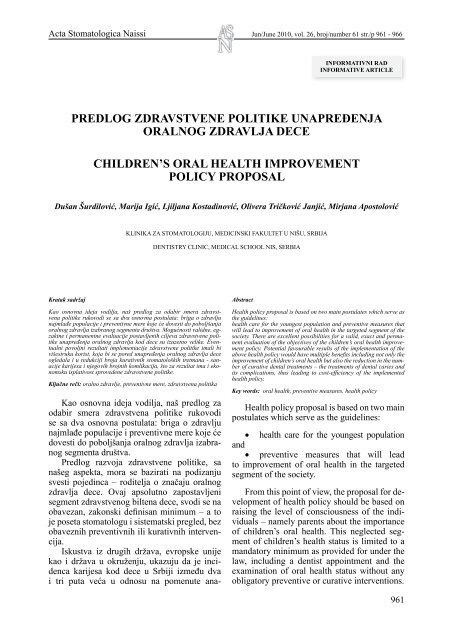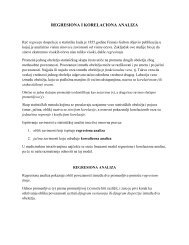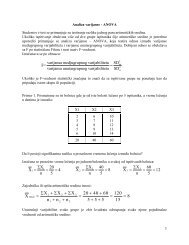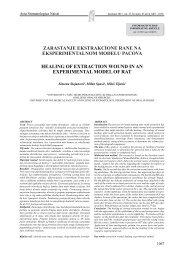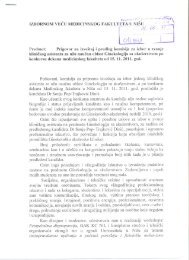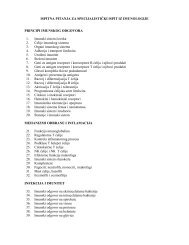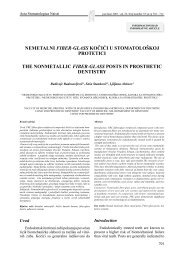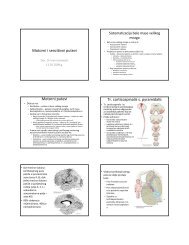Full text - Medicinski fakultet
Full text - Medicinski fakultet
Full text - Medicinski fakultet
You also want an ePaper? Increase the reach of your titles
YUMPU automatically turns print PDFs into web optimized ePapers that Google loves.
acta stomatologica naissi jun/june 2010, vol. 26, broj/number 61 str./p 961 - 966<br />
Šurdilović i sar. / Predlog zdravstvene Politike unaPređenja oralnog zdravlja dece<br />
Predlog zdravstvene Politike unaPređenja<br />
oralnog zdravlja dece<br />
children’s oral health imProvement<br />
Policy ProPosal<br />
Dušan Šurdilović, Marija Igić, Ljiljana Kostadinović, Olivera Tričković Janjić, Mirjana Apostolović<br />
Kratak sadržaj<br />
klinika za stomatologiju, medicinski <strong>fakultet</strong> u niŠu, srBija<br />
Kao osnovna ideja vodilja, naš predlog za odabir smera zdravstvena<br />
politike rukovodi se sa dva osnovna postulata: briga o zdravlju<br />
najmlađe populacije i preventivne mere koje će dovesti do poboljšanja<br />
oralnog zdravlja izabranog segmenta društva. Mogućnosti validne, egzaktne<br />
i permanentne evaluacije postavljenih ciljeva zdravstvene politike<br />
unapređenja oralnog zdravlja kod dece su izuzetno velike. Eventualni<br />
povoljni rezultati implementacije zdravstvene politike imali bi<br />
višestruku korist, koja bi se pored unapređenja oralnog zdravlja dece<br />
ogledala i u redukciji broja kurativnih stomatoloških tretmana - sanacije<br />
karijesa i njegovih brojnih komlikacija, što za rezultat ima i ekonomsku<br />
isplativost sprovedene zdravstvene politike.<br />
Ključne reči: oralno zdravlje, preventivne mere, zdravstvena politika<br />
kao osnovna ideja vodilja, naš predlog za<br />
odabir smera zdravstvena politike rukovodi<br />
se sa dva osnovna postulata: briga o zdravlju<br />
najmlađe populacije i preventivne mere koje će<br />
dovesti do poboljšanja oralnog zdravlja izabranog<br />
segmenta društva.<br />
Predlog razvoja zdravstvene politike, sa<br />
našeg aspekta, mora se bazirati na podizanju<br />
svesti pojedinca – roditelja o značaju oralnog<br />
zdravlja dece. ovaj apsolutno zapostavljeni<br />
segment zdravstvenog biltena dece, svodi se na<br />
obavezan, zakonski definisan minimum – a to<br />
je poseta stomatologu i sistematski pregled, bez<br />
obaveznih preventivnih ili kurativnih intervencija.<br />
iskustva iz drugih država, evropske unije<br />
kao i država u okruženju, ukazuju da je incidenca<br />
karijesa kod dece u srbiji između dva<br />
i tri puta veća u odnosu na pomenute ana-<br />
dentistry clinic, medical school nis, serBia<br />
Abstract<br />
inFormativni rad<br />
inFormative article<br />
Health policy proposal is based on two main postulates which serve as<br />
the guidelines:<br />
health care for the youngest population and preventive measures that<br />
will lead to improvement of oral health in the targeted segment of the<br />
society. There are excellent possibilities for a valid, exact and permanent<br />
evaluation of the objectives of the children’s oral health improvement<br />
policy. Potential favourable results of the implementation of the<br />
above health policy would have multiple benefits including not only the<br />
improvement of children’s oral health but also the reduction in the number<br />
of curative dental treatments – the treatments of dental caries and<br />
its complications, thus leading to cost-efficiency of the implemented<br />
health policy.<br />
Key words: oral health, preventive measures, health policy<br />
health policy proposal is based on two main<br />
postulates which serve as the guidelines:<br />
• health care for the youngest population<br />
and<br />
• preventive measures that will lead<br />
to improvement of oral health in the targeted<br />
segment of the society.<br />
from this point of view, the proposal for development<br />
of health policy should be based on<br />
raising the level of consciousness of the individuals<br />
– namely parents about the importance<br />
of children’s oral health. this neglected segment<br />
of children’s health status is limited to a<br />
mandatory minimum as provided for under the<br />
law, including a dentist appointment and the<br />
examination of oral health status without any<br />
obligatory preventive or curative interventions.<br />
961
acta stomatologica naissi, jun/june 2009, vol. 25, broj/number 59<br />
lizirane države i zajednice. razlog za ovu,<br />
može se reći, poražavajuću činjenicu leži prevashodno<br />
u nedovoljno razvijenoj zdravstvenoj<br />
kulturi društva, teškom ekonomskom miljeu,<br />
opterećenom brojnim događajima u skorijoj<br />
prošlosti, koji su zasigurno uticali na depresiju<br />
oralnog zdravlja čitave nacije, pa shodno tome<br />
i populacije dece, koja je posebno vulnerabilna<br />
na ovu patologiju.<br />
kao svedoci tektonskih promena izvršenih<br />
u protekloj deceniji u zravstvenom sektoru republike<br />
srbije, mora se priznati znatno jačanje<br />
infrastrukture primarne zdravstvene zaštite, kao<br />
i njeno definisanje u vodeću granu medicine.<br />
ministarstvo zdravlja, sa svoje strane, u<br />
proteklim godinama nije isticalo oralno zdravlje<br />
nacije, pa samimi tim ni dece, kao prioritet<br />
zdravstvene politike države. ta činjenica je<br />
umnogome uticala na trenutno stanje oralnog<br />
zdravlja, kao i na posledične rezultate nedelovanja<br />
u tom pravcu. celokupna stomatološka<br />
zdravstvena zaštita je dovedena u sporedni kolosek<br />
prioriteta zdravlja zbog otežanog finansiranja,<br />
što dovodi i do demotivacije stomatologa u<br />
državnom sektoru. Privatni sektor stomatološke<br />
struke generalno nije fokusiran na oralno<br />
zdravlje dece, kako zbog specifičnosti ambulantnog<br />
rada sa decom, tako i zbog činjenice<br />
da su jedino deca podpala pod obavezni vid<br />
pružanja stomatoloških zdravstvenih usluga, pa<br />
su samim tim u visokom procentu orjentisana<br />
ka državnom sektoru stomatološke zdravstvene<br />
zaštite.<br />
Predlog mera ove zdravstvene politike imao<br />
bi za cilj unapređenje oralnog zdravlja kod<br />
dece. ovaj opšti cilj u sebi sadrži i specifične<br />
ciljeve iz domena rada javnog zdravtsveno sektora<br />
kao i aktiviranja čitave javnosti.<br />
Prvi specifični cilj bio bi usmeren ka<br />
roditeljima – staraocima dece u smislu permanentnog<br />
ukazivanja na značaj oralnog zdravlja.<br />
ovaj cilj je ostvariv kroz multisektornu aktivnost<br />
više različitih zainteresovanih strana i to:<br />
zdravstvenih ustanova, škola, sredstava javnog<br />
informisanja, lokalne zajednice i države oličene<br />
u ministarstvu zdravlja. aktivnim propagiranjem<br />
pojma oralnog zdravlja kao i permanetnom<br />
edukacijom roditelja u školama, zdravstvenim<br />
ustanovama i medijima, ove akcije imaju za cilj<br />
podizanje svesti poulacije o veličini i značaju<br />
ovog problema.<br />
drugi specifični cilj bi bio usmeren na stomatologe<br />
– pružaoce usluga koji bi bili, ak-<br />
962<br />
analysis in the eu member states and in the<br />
neighboring countries indicate that caries incidence<br />
in children in serbia is two to three times<br />
higher compared to that in the above mentioned<br />
countries and the european union. the reasons<br />
for this crushing fact are found primarily in underdeveloped<br />
health culture of the society, in<br />
grave economic situation and the burden of numerous<br />
events in the recent past that have been<br />
adversely affecting, for sure, oral health of the<br />
entire nation and, consequently, of the population<br />
of children being particularly vulnerable to<br />
this kind of pathology.<br />
as the witnesses of crucial changes made<br />
over the past decade in the health sector in the<br />
republic of serbia, we must admit a considerable<br />
improvement in primary health care infrastructure,<br />
as well as the fact that it has been defined<br />
as a leading branch of medicine.<br />
the ministry of health, on its part, did not<br />
outline neither oral health of the nation nor of<br />
the children as a priority in the national health<br />
policy. this fact had a considerable impact on<br />
the current oral health status, as well as on the<br />
consequences arising out of failure to act in that<br />
respect. the entire dental health care has been<br />
brought on the sidetrack of health priorities due<br />
to financial difficulties, resulting in lack of motivation<br />
of the dentists employed with the stateowned<br />
institutions. generally speaking, private<br />
dentists are not focused on oral health of children<br />
not only due to specific aspects of work<br />
with children in out-patient facilities but also<br />
due to the fact that only children are included in<br />
the compulsory dental care program and thus,<br />
are mostly oriented towards public dental services.<br />
the measures outlined in this health policy<br />
are aimed at improving oral health of children.<br />
this general objective also implies certain specific<br />
objectives related to the services in public<br />
health sector, as well as in terms of involving<br />
the general public.<br />
the first specific objective would target<br />
the parents – guardians in terms of keeping<br />
them permanently aware of the importance of<br />
children’s oral health. this objective may be<br />
achieved through multi-sector activities involving<br />
several interested parties, such as for e.g.:<br />
medical institutions, schools, mass media, local<br />
communities and governments acting through<br />
the ministry of health. By active promotion<br />
of the concept of oral health and through permanent<br />
parental education at schools, medical<br />
institutions and in the media, the above actions<br />
are aimed at increasing the level of awareness<br />
of the population of the importance and significance<br />
of this issue.
tivnostima u prvom redu ministarstva zdravlja,<br />
sagledani kao važan instrument u sprovođenju<br />
ove politike i koji bi zakonskom regulativom bili<br />
dovedeni u situaciju da imaju radni, finansijski<br />
i organizacioni ambijent za unapređenje kvantitativnih<br />
i kvalitativnih parametara sprovođenja<br />
mera iz domena preventivne stomatologije.<br />
Činjenica da je školska stomatološka nega,<br />
na sreću, organizovana po istočno evropskom<br />
modelu koji datira od pre četiri decenije<br />
predstavlja snagu i prednost u sprovođenju<br />
kvalitetnije stomatološke brige o deci. naime,<br />
gotovo svaka osnovna škola u republici ima<br />
stomatološku ordinaciju, što sa aspekta organizovanja<br />
školske stomatološke nege predstavlja<br />
izuzetne prednost. ovi organizacioni i ljudski<br />
kapaciteti, na žalost, nisu potpuno iskorišćeni<br />
i zasnivaju se na ličnim motivacijama stomatologa<br />
u samoj ordinaciji. zbog obimnog kurativnog<br />
dela posla, po pravilu izvršioci – stomatolozi<br />
školske stomatološke nege zapostavljaju<br />
prevenciju, kako kod dece – pacijenata tako i<br />
kod pratioca roditelja, u smislu njihove edukacije<br />
za značaj preventivnih mera kod dece.<br />
na ovome mestu dolazimo i do veoma<br />
važnog pitanja, realne mogućnosti da se ovaj<br />
projekat – smer zdravstvene politike ostvari,<br />
odnosno, da li je politika izvodljiva. već pomenuti<br />
stručni i infrastrukturni kapaciteti ne<br />
dovode u pitanje izvodljivost programa, čime<br />
je i realizacija ove zdravstvene politike realan<br />
i dostižan projekat. aktiviranjem svih<br />
postojećih kapaciteta i ozbiljnim i odgovornim<br />
angažovanjem svih zainteresovanih strana politika<br />
unapređenja oralnog zdravlja ima realne<br />
osnove za merljiv uspeh i održivo poboljšanje<br />
merenih parametara oralnog zdravlja.<br />
zdravstvena politika – poboljšanje oralnog<br />
zdravlja kod dece, može se posmatrati i<br />
voditi kako na nivou lokalne zajednice, tako i<br />
na državnom nivou. u tom smislu predlažemo<br />
sledeće mere koje će dovesti do uspešnog<br />
sprovođenja ove zdravstvene politike:<br />
- aktiviranje lokalne zajednice koja bi<br />
propagadnim i edukativnim akcijama na lokalnom<br />
nivou dovela do poboljašanja sprovođenja<br />
preventivnih mera.<br />
- uključivanje različitih sredstava javnog<br />
informisanja u realizaciju politike neminovno<br />
dovodi do veće zainteresovanosti društvene zajednice<br />
za rešavanje problema kojim se zdravstvena<br />
politika bavi.<br />
Šurdilović et al. / children’s oral health imProvement Policy ProPosal<br />
the second specific objective should target<br />
the dentists – providers of dental services who,<br />
primarily through the activities undertaken by<br />
the ministry of health, would be considered an<br />
important factor in the implementation of this<br />
policy and who, by virtue of legal regulations,<br />
would be brought in a position to have working<br />
environment and financial and organizational<br />
resources in order to improve both quantitative<br />
and qualitative parameters required for implementation<br />
of the measures in the field of preventive<br />
dentistry.<br />
the fact that fortunately dental care for<br />
school children has been organized based on<br />
the east european model dating back 40 years<br />
ago, means a benefit and advantage in terms of<br />
implementing improved children’s dental care.<br />
namely, almost every elementary school in the<br />
republic of serbia has its own dental service,<br />
which is an extraordinary advantage in terms<br />
of the organization of school dental care. unfortunately,<br />
these organizational and human resources<br />
have not been fully exploited and are<br />
limited to personal motivation of the dentists in<br />
such dental services. as a rule, due to extensive<br />
curative work, such dentists often neglect<br />
preventive work, both with their patients – children<br />
and with the parents accompanying the<br />
children, in terms of educating parents about<br />
the importance of preventive measures in children<br />
dental care.<br />
at this point, we come to a very important<br />
issue – the real possibilities to implement such a<br />
project, i.e. the course of health policy. in other<br />
words, we may raise the question if the policy<br />
is feasible. the above mentioned human and<br />
infrastructural resources do not jeopardize the<br />
implementation of the program, thus turning<br />
the implementation of this health policy into a<br />
realistic and achievable project. By engaging<br />
all of the existing resources, through competent<br />
and responsible involvement of all interested<br />
parties, the policy of improving dental health<br />
boasts sound basis for a measurable success and<br />
sustainable improvements of dental health measurable<br />
parameters.<br />
the health policy for improvement of children’s<br />
oral health may be considered and implemented<br />
from the local community level up<br />
to national level. in that respect, the following<br />
measures are proposed in order to provide<br />
successful implementation of the above health<br />
policy:<br />
- engagement of local community which<br />
could, through promotional and educational activities<br />
at the local level lead to better implementation<br />
of preventive measures;<br />
963
acta stomatologica naissi, jun/june 2009, vol. 25, broj/number 59<br />
- zakonskim i podzakonskim aktima na<br />
republičkom nivou motivisati izvršioce usluga<br />
da obavljaju preventivne zadatke – preventivne<br />
mere i edukacije stanovništva. veoma važan je<br />
upravo ovaj segment u definisanju i izvršenju<br />
postavljenih cijeva zdravstvene politike jer zakonskom<br />
regulativom treba definisati vreme i<br />
deo učinka stoamtologa za rad u preventivnom<br />
delu posla, kao i zakonski definisati obim<br />
obaveznih preventivnih mera školske dece,<br />
poput zalivanja fisura zuba koje bi, kao i vakcinacija,<br />
bilo obavezno za svako dete prilikom<br />
polaska o osnovnu školu.<br />
mogućnosti validne, egzaktne i permanentne<br />
evaluacije postavljenih ciljeva zdravstvene<br />
politike unapređenja oralnog zdravlja<br />
kod dece su izuzetno velike. jasno definisani<br />
statistički indeksi, mere i vrednosti, koji inače<br />
predstavljaju osnovu epidemioloških studija u<br />
stomatološkoj nauci, omogućavaju jasan uvid<br />
u rezultate implementacije zdravstvene politike.<br />
evaluacija uspeha projekta je izvodljiva i<br />
može se u jasno definisanim vremenskim okvirima<br />
periodičnosti izvršavati. ta činjenica<br />
omogućuje egzaktan uvid u kvalitet izvršenih<br />
mera zdravstvene politike na duži vremenski period.<br />
uvidom u progres predložene politike, na<br />
osnovu pomenutih parametara oralnog zdravlja<br />
dece, moguće su i kasnije korekcije specifičnih<br />
ciljeva koje bi dovele do poboljšanja rezultata<br />
sprovođenja zdravstvene politike.<br />
eventualni povoljni rezultati implementacije<br />
zdravstvene politike imali bi višestruku<br />
korist, koja bi se pored unapređenja oralnog<br />
zdravlja dece ogledala i u redukciji broja kurativnih<br />
stomatolških tremana - sanacije karijesa<br />
i njegovih brojnih komlikacija, što za rezultat<br />
ima i ekonomsku isplativost sprovedene<br />
zdravstvene politike.<br />
964<br />
- involvement of various mass media in<br />
policy implementation would inevitably lead to<br />
the increased motivation of the social community<br />
to take part in resolving of health policy<br />
issues;<br />
- laws and by-laws at the national level<br />
should motivate service providers to carry out<br />
preventive tasks – preventive measures and to<br />
educate the population. this segment, in particular,<br />
is important in defining and implementing<br />
health policy objectives, since legal regulations<br />
should determine the time the dentist’s should<br />
dedicate to preventive work and the norms of<br />
such work. in addition, the laws should regulate<br />
the scope of compulsory preventive measures<br />
in school children dental health care, such as<br />
for e.g. dental sealants, which should become<br />
compulsory for each child when entering the<br />
elementary school, just like vaccination.<br />
there are excellent possibilities for a valid,<br />
exact and permanent evaluation of the objectives<br />
of the children’s oral health improvement<br />
policy. clearly defined statistical index, measures<br />
and values, which are anyway the basis of<br />
epidemiological studies in dental science, provide<br />
clear insight into the results of health policy<br />
implementation. Project outcome evaluation<br />
is feasible and can be performed in clearly defined<br />
periodical time frames. this fact enables<br />
an exact insight into the quality of the implemented<br />
health policy measures in the long run.<br />
Based on the insight into the progress of the<br />
proposed policy and on the above mentioned<br />
parameters related to children’s oral health, further<br />
corrections of specific objectives could be<br />
made resulting in better outcome of the health<br />
policy implementation.<br />
Potential favourable results of the implementation<br />
of the above health policy would<br />
have multiple benefits including not only the<br />
improvement of children’s oral health but also<br />
the reduction in the number of curative dental<br />
treatments – the treatments of dental caries and<br />
its complications, thus leading to cost-efficiency<br />
of the implemented health policy.
Šurdilović i sar. / Predlog zdravstvene Politike unaPređenja oralnog zdravlja dece<br />
afroughi s, faghihzadeh s, khaledi mj, motlagh<br />
mg: dental caries analysis in 3-5 years old children:<br />
a spatial modelling. arch oral Biol. 2010 apr 8. epub<br />
ahead of print<br />
Bönecker m, ardenghi tm, oliveira lB, sheiham a,<br />
marcenes W.trends in dental caries in 1- to 4-year-old<br />
children in a Brazilian city between 1997 and 2008. int j<br />
Paediatr dent. 2010 mar;20(2):125-31.<br />
evropski zdravstveni Portal (eu - health Portal)<br />
http://health.europa.eu<br />
Adresa za korespondenciju:<br />
doc dr dušan Šurdilović<br />
dusan.surdilovic@gmail.com<br />
LITERATURA / REFERENCES<br />
european commission, dg health http://ec.europa.<br />
eu/health/index_en.htm<br />
centers for disease control and Prevention http://<br />
www.cdc.gov<br />
croatian national institute of Public health http://<br />
www.hzjz.hr<br />
http://www.batut.org.rs<br />
Program preventivne stomatološke zaštite republike<br />
srbije. stomatološki <strong>fakultet</strong> Beogra 2009.<br />
Address of correspondence:<br />
ass. Prof. dušan Šurdilović, d.d.s., msc, Ph.d.<br />
18000, nis, serbia<br />
dusan.surdilovic@gmail.com<br />
965
acta stomatologica naissi decembar/december 2009, vol. 25, br./num. 60<br />
acta stomatologica naissi, jun/june 2009, vol. 25, broj/number 59<br />
966<br />
konFerencije, kongresi i kursevi<br />
conFerences, congresses and courses*<br />
september 16, 2010 - september 18, 2010<br />
2nd congress of the european society of microscope dentistry<br />
vilnius, lithuania<br />
october 06, 2010 - october 08, 2010<br />
Prague dental days<br />
Prague, czech republic<br />
october 14, 2010 - october 15, 2010<br />
sedation and anesthesia in dentistry<br />
evian-les-Bains, france<br />
october 22, 2010 - october 25, 2010<br />
american institute of oral Biology 67th annual meeting<br />
Palm springs, california, united states<br />
november 11, 2010 - november 13, 2010<br />
fti2010-future trends in implantology<br />
florence, italy<br />
november 12, 2010 - november 13, 2010<br />
f.a.c.e. 2010 - facial aesthetic & cosmetic events<br />
marrakesh, morocco<br />
november 26, 2010 - november 27, 2010<br />
2nd conference on Positive aging<br />
vancouver, Bc, canada<br />
november 01, 2011 - november 04, 2011<br />
20th international conference on oral and maxillofacial surgery<br />
santiago, chile<br />
* http:www.docguide.com/crc.nsf/congresses<br />
NOVOSTI I OGLASI<br />
neWs and announcements


